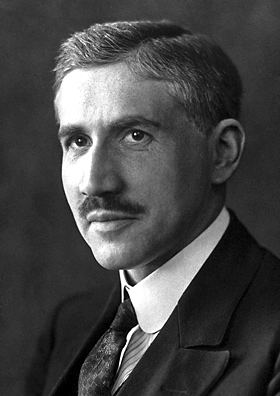Otto Meyerhof lecture series
The University of Heidelberg is hosting an online lecture series named after Nobel Prize–winning biochemist Otto Meyerhof. It will be streaming from May 31 through July 19.
Meyerhof studied cellular oxidation and heat production — in other words, metabolism.

Working with physiologist A.V. Hill, he studied energy cycling in frog muscle cells, discovering that lactic acid fermentation had a predictable relationship with oxygen availability. When oxygen was absent, glycogen was converted into lactic acid, whereas when oxygen was abundant, little lactic acid fermentation occurred. The pair earned the 1922 Nobel Prize for Physiology or Medicine for the work.
Through the 1920s and 1930s, Meyerhof continued to investigate the mechanisms of glycolysis, discovering over a third of the enzymes we now know are involved in glycogen breakdown. Along the way, his group also found that phosphorylated molecules (such as ATP) are rich in energy, laying the groundwork for our modern appreciation of ATP as a cellular energy carrier.
He became a director of the Kaiser Wilhelm Institute for Medical Research at Heidelberg in 1929 but was forced out in 1938 as antisemitism grew. To escape the Nazi regime, he moved his family to Paris but then had to flee again.
According to his Nobel biography, “Eventually, with the help of the Unitarian Service Committee, he reached Spain and ultimately, in October 1940, the United States,” where he had a professorship waiting for him at the University of Pennsylvania. Fittingly, the forthcoming lecture series’ theme is “A scientist’s life between honor and exile.”
The series, which will be subtitled in English, will begin with a biographical talk by Michael Schmitt, a physician and researcher at Heidelberg. Other talks by scholars will cover antisemitism at the university, Jewish communities in Germany and modern-day antisemitism.
David Meyerhof, the biochemist’s grandson and a retired science, technology, engineering and mathematics educator, provided a written statement to be shared at the start of event. It reads, in part: “He never stopped working, despite the tremendous hardships that he and his family endured while escaping from the Nazis during World War II and surviving the Holocaust. He said, ‘Whatever happens, they cannot reach our souls.’”
Otto Meyerhof died in 1951 at age 67. You can read more about his research in a Journal of Biological Chemistry “Classic” article.
Enjoy reading ASBMB Today?
Become a member to receive the print edition four times a year and the digital edition monthly.
Learn moreGet the latest from ASBMB Today
Enter your email address, and we’ll send you a weekly email with recent articles, interviews and more.
Latest in People
People highlights or most popular articles

2026 ASBMB election results
Meet the new Council members and Nominating Committee member.

Simcox wins SACNAS mentorship award
She was recognized for her sustained excellence in mentorship and was honored at SACNAS’ 2025 National Conference.

From humble beginnings to unlocking lysosomal secrets
Monther Abu–Remaileh will receive the ASBMB’s 2026 Walter A. Shaw Young Investigator Award in Lipid Research at the ASBMB Annual Meeting, March 7-10 in Washington, D.C.

Chemistry meets biology to thwart parasites
Margaret Phillips will receive the Alice and C. C. Wang Award in Molecular Parasitology at the ASBMB Annual Meeting, March 7-10 in Washington, D.C.

ASBMB announces 2026 JBC/Tabor awardees
The seven awardees are first authors of outstanding papers published in 2025 in the Journal of Biological Chemistry.

Decoding how bacteria flip host’s molecular switches
Kim Orth will receive the Earl and Thressa Stadtman Distinguished Scientists Award at the ASBMB Annual Meeting, March 7–10, just outside of Washington, D.C.
